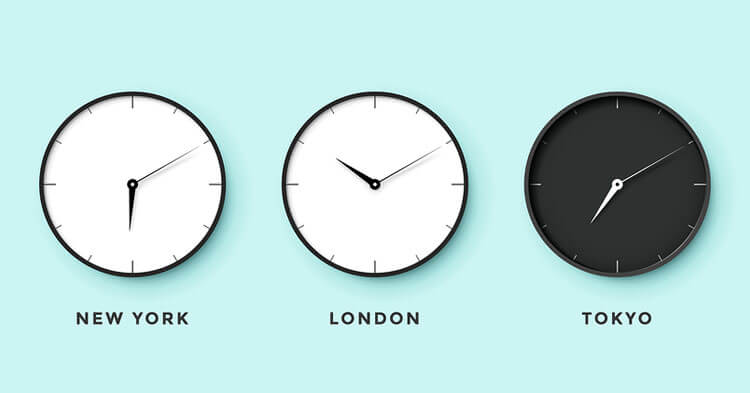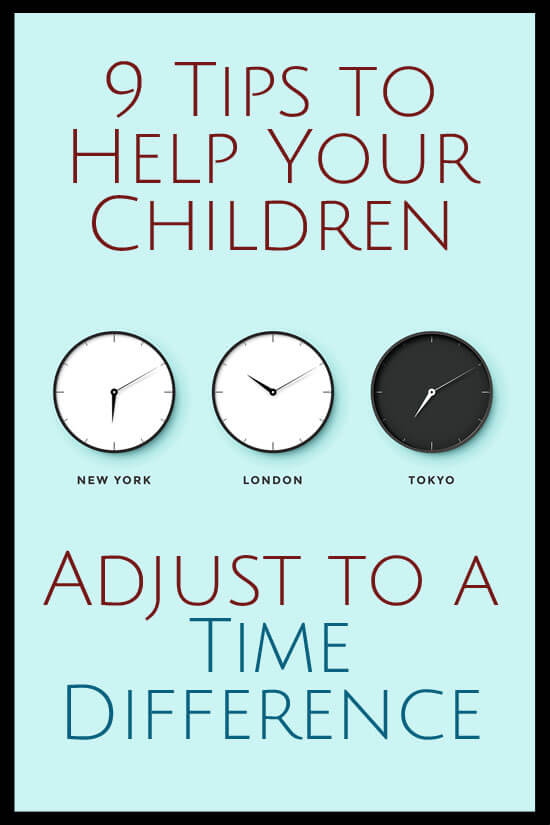9 Tips to Help Your Children Adjust to a Time Difference

At 16 months of age, the Joy Boys have made the trip from Los Angeles to New York once, and from Hawaii to NY twice. Kiran’s family lives here, and we are committed to visiting them twice a year.
From what I’ve heard, many parents get just as–if not more–nervous about how their Little Ones will handle a dramatic time difference than they do about plane travel.
I’m here to ease your anxiety. Time changes are way less of a big deal for your babies than they are for you.
In fact, my twins class teacher had told us to expect our infants to adjust by one hour per day. I find that my kids do way better than that.
We have a six-hour time difference in the case of Hawaii-New York. On our last trip, at 11 months, it took the boys two nights to adjust. This trip, at 16 months, I was sure it would take longer. It didn’t. Two nights after we had arrived, the Joy Boys went to bed at 7:15 pm, slept through the night without a peep, and woke up at 7:30 am.
How do we manage? Here are some tips.
- Don’t get stressed out about it. Trust your babies to adapt. Since they don’t understand clock time, they’re not going to worry about that time difference as much as you are. They’re just going to be in the moment, as they always are.
- Take a red-eye if you can. To be honest, arriving in New York is easier than going home to Hawaii, and I’m pretty convinced it’s because we can take a red-eye to get here (we have no choice but to fly all day on the way home). The boys don’t sleep much on the flight – maybe a few solid hours. They’re too active and excited. Of course, we let them nap when we arrive (but not too long – see next tip). The good thing is, they’re so exhausted by the time they reach evening, our first full night on the East Coast that they will fall asleep early, around 8 pm. On both trips, they have woken up crying around 10/11pm but were so tired that their eyes remained closed. I just gave them some milk and rocked them back to sleep within an hour.
- Limit naps. Yes, your babies are going to want to nap all day if there is a big time difference. Don’t let them. Allow them maybe four hours of napping if they’re simply beaten, but then wake them up. We got the Joy Boys up from their post red-eye nap after four hours, and they were sleepy enough to fall asleep by 8 pm that first night.
- Don’t let your babies sleep in too late or go to bed too early. The same rule applies as to naps. If you let them sleep in until noon on the first or second day when you’ve flown East, or if you let them go to bed at 3 pm if you’ve flown West, then you won’t make any progress. Don’t panic about them being a little more tired than usual. Let them get a solid 8 -10 hours of sleep, but you may have to keep them up a good bit past when they want to crash out or wake them up before they’ve had their usual 12 hours. They’ll be a bit cranky and tired, but they’ll adjust in just a couple of days.
- Expose them to plenty of sunlight. This is key. Babies’ clocks don’t go by the time on your watch; they go by sunlight. When they’re up, get them outdoors where they are exposed to (indirect) sunshine as much as possible. This will reset their bodies faster than you can say Jack Rabbit.
- Keep them active. When they’re up, have them running around (outside, if possible). Playgrounds. Parks. Other kids. Whatever it takes – get them physically active so they’ll be extra tired.
- Maintain your usual bedtime routine. This is also critical. At home, we have dinner at 5 pm, start bath at 6 pm, read books and give milk at 6:30 pm, brush teeth at 6:45 pm, and go to bed at 7. We take this show on the road, even if the timing is off. The babies were not ready for bed at 7 pm our first night in NY when it was 1 pm in Hawaii. But we wore them out by running around outside, then started the usual bath-books-bed routine at 7 pm, so they were totally ready to crash by 8. Your Little Ones will pick up on the cues, even if their bodies feel out of whack. “Oh, I know what’s going on!” their baby brains will say.
- But shift your meal schedule. Do your best to start from Day 1 eating breakfast, lunch, snack and dinner on your new schedule. This will also help give your babies’ bodies more of those unconscious cues about what’s going on.
- Or… Don’t bother with the time change at all! If the time difference is 2 hours or less, or if you’re only staying for a couple of days, don’t bother. Just keep to your schedule according to the time it is back home.
READ MORE IN THE FAMILY ROOM
PIN THIS FOR LATER:
This post was syndicated with permission to BonBon Break Media LLC.





